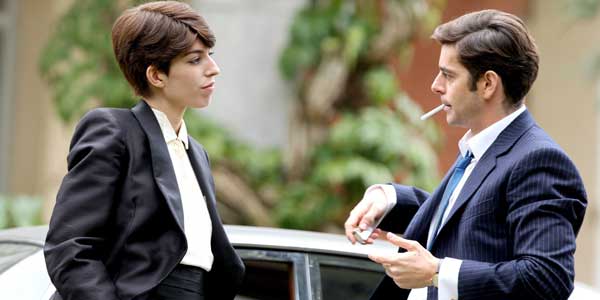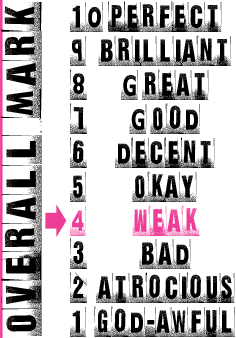
Director: Laure Charpentier
Running Time: 100 mins
Certificate: 18
Release Date: November 14th, 2011

Director Laure Charpentier adapts one of her own controversial books for the screen, with this tale of gangsters, prostitutes and Sapphic desire in 1960s Paris. After her lover commits suicide, Gigola butches up, starts being emotionally aloof and becomes part of an underworld of prostitutes, gangsters and pimps.
Gigola seems to have a power to draw people in, whether it’s a hooker (Marie Kremer) who becomes Gigola new project, an older woman (Marisa Paredes) who falls for her, or a gangster(Eduardo Noriega), who may be the only person who can break through her hard veneer. All this while dealing with her needy mother and opium fiend father, and trying to save her childhood home.
Although made on a relatively small budget, Gigola does a good job of evoking 60s Paris, even if it is a rather stylised world. However the film suffers from the malady that affects a lot of French movies, which is to be more interesting intellectually than it is emotionally. The film is full of interesting ideas and it certainly engages you with brain with what it’s trying to do.
That would be fine on its own if Gigola weren’t supposed to be such a human and emotional story at its core. The title character is supposed to emotionally cold after her lover’s suicide, but the character’s progression is never fully played out, so that she jumps from being cold, to capricious, to outright cruel, to showing a heart, with little sense of this being a journey she or we are on. Emotionally everything seems too arbitrary, even if intellectually you know exactly what the films is trying to do. It is the very French film thing of doing a good job of talking about the human condition without making the characters seeming 100% believably human.
A feeling of choppiness runs through the entire movie, not just the main character, as if necessary scenes have been missed out and the audience is left to fill in the blanks. To a certain extent filmmakers can get away with that, but it happens too often here. For example, in one scene Gigola’s mother disowns her child, but a minute or two later everything seems okay between then again. Presumably they made up at some point, but with no bridging scene or explanation it gives things a disjointed feel.
It’s not the end of the world, but does result in a movie that is fully engaging for your brain, exploring ideas of gender, sexuality, violence and power (and has plenty of interesting ideas about them) but on an emotional level, feels lacking. It’s particularly frustrating at the very end, as the last few minutes should be emotionally devastating, but are more likely leave you simply stroking your chin with interest.
Overall Verdict: It looks great and there’s plenty to challenge your brain with its exploration of gender and sexuality, but its disjointed style robs it of an emotional hook.
Reviewer: Tim Isaac





Leave a Reply (if comment does not appear immediately, it may have been held for moderation)